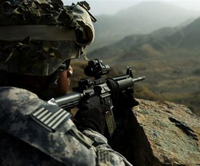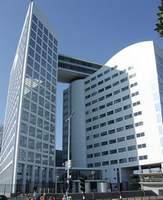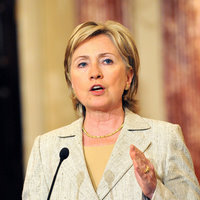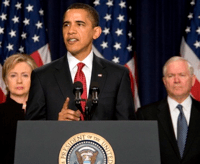Brazil and India recently signed an agreement to improve air travel between the two countries, the latest small step in a broad bilateral relationship. In an email interview, Oliver Stuenkel, a fellow at the Global Public Policy Institute in Berlin, discussed Brazil-India relations. WPR: What is the state of trade between Brazil and India, including areas of complementarity and competition? Oliver Stuenkel: Trade between Brazil and India has grown significantly since the end of the Cold War, from $400 million in 1999, to $2 billion in 2005, passing $7 billion in 2010. A trade agreement between Mercosur — a regional […]
Latest Archive
Free Newsletter
Six people were reportedly killed and dozens more wounded when security forces opened fire on protesters in Syria. Residents say the violence occurred at the Omari mosque in the south city of Deraa, which has been the focal point of a string of small but unprecedented rallies calling for the end of the ruling Assad regime.

The military operation that the U.S., the U.K. and France have launched against Libyan leader Moammar Gadhafi thus far lacks a clear set of strategic goals. The coalition partners cannot agree regarding whether the operation is intended to remove Gadhafi, to support rebel operations against Gadhafi loyalists or simply to protect civilians from attack by Gadhafi’s military forces. The lack of a strong, well-defined set of strategic objectives means that military operations in and over Libya are likely to be incoherent. All this is bad enough, but perhaps worse is that there is little indication that France, the U.K. or […]

For observers and advocates of the International Criminal Court (ICC), the Feb. 26 U.N. Security Council resolution imposing sanctions on Libya (.pdf) was nothing short of a breakthrough: It marked the first time a decision to refer crimes to the ICC was backed by all members — including the United States, which has been openly hostile to the court for much of its existence. Three weeks later, the U.S. showed support for the ICC yet again, albeit less publicly. During informal talks at the Security Council on March 18, a Kenyan delegation lobbied for a one-year deferral of two ICC […]
Recent events in Libya have refocused attention on Libya’s remaining chemical agents, with particular concern over the possibility that Moammar Gadhafi will use them against the Libyan insurgents or against other targets, such as Western civilians. But there are also fears that the Libyan government could somehow lose control of some of the agents, whether due to ongoing domestic chaos or an eventual collapse of the regime, allowing terrorists to acquire them. Leaders of the coalition currently enforcing the U.N.-mandated no-fly zone over Libya need to adopt a strong declaratory policy against any misuse of these agents, even while they […]

As an Army brat who grew up traveling the world, I’ve witnessed first-hand both the power and sense of hope that the United States projects around the globe. These qualities stem from both the might of our military as well as the less tangible characteristics of our diplomatic and compassionate efforts. In decades past, the roles of the State Department and Defense Department were often considered to be parallel and discrete. State negotiated treaties and engaged in diplomatic and aid missions around the globe, whereas Defense was brought to bear when words failed to suffice. Despite being complementary, these elements […]
Greg Scoblete responded to my argument in support of a military intervention in Libya, which he aptly dubbed the “Because We Can” standard, by questioning just what it is we think we can do: It’s important to recognize that intervening in Libya and bombing Gaddafi’s supporters is not the same thing as finding a politically acceptable end-state to the country’s rebellion — a fact that is being resolutely overlooked by most of the campaign’s supporters. So, yes, there are very low barriers to entry in Libya, which makes it attractive where a campaign against Bahrain or Burma is much less […]

The opening acts of the 21st century have fundamentally challenged long-held notions of military power. The past decade has unveiled not only the disruptive power of terrorist groups with global reach, but also the ability of low-budget insurgent groups to directly confront the best military forces of the West — with surprising success. Moreover, recent revolutionary events across the Arab world have demonstrated the limits of military power when facing mass popular uprisings. Disorder, chaos and violent extremism seem on course to replace state-on-state violence as the most common forms of conflict in the new century. Given this new security […]

The diffusion of power in the 21st century from states to nonstate actors has left more and more things outside the control of even the most powerful states. To accomplish their goals, states must do better at leveraging their smart power, which combines the hard power of coercion and payment with the soft power of persuasion and attraction. Doing so will often require wielding power with others rather than over them. What will it mean to wield power in the global information age of the 21st century? What resources will produce power? In the 16th century, control of colonies and […]

For many years, the United States has been the world’s most powerful nation. It remains the undisputed global leader in military power and still possesses vast economic and cultural influence. And while Washington’s ability to combine both hard and soft power to influence world events — what Joseph Nye calls “smart power” — has diminished somewhat, it is still in a far superior position relative to any other country. U.S. primacy, however, comes with opportunity costs. An alternate path might have delivered a comparable level of security at far less expense and risk. Even many who unabashedly celebrate our 20-year […]

One of the most revealing features of today’s international system is that only two nations, America and China, possess sufficient power to truly disrupt it — either directly, through the application of military force, or indirectly, by unleashing an uncontainable economic crisis. In fact, to truly derail globalization in its current trajectory, the two would need to act in concert, either by fighting each other directly or experiencing simultaneous economic collapses. Short of those two scenarios, modern globalization remains highly resilient to shocks of all sorts. That resilience is the only power that really matters in this world. It defines […]
The extent to which events in Libya have overshadowed President Barack Obama’s Latin America tour can’t be overstated. With the U.S. president in El Salvador today after previous stops in Brazil and Chile, there’s a good deal of speculation about why he decided to press forward with the trip rather than reschedule. Many believe the tour is a “move to counteract the rising influence of China, which is in the midst of an unprecendented energy grab in the oil- and mineral-rich region,” according to a report in the Christian Science Monitor, which asserted that “the Chinese yuan is contesting U.S. […]

There is no popular or expert consensus about which actors possess economic power in the 21st century. Public uncertainty is reflected in the April 2010 Pew Global Attitudes survey, which reveals interesting cross-country discontinuities in the perception of power. When asked to identify “the world’s leading economic power,” a majority of respondents in a diverse array of developing countries — including Brazil and India — name the United States. On the other hand, in the developed world, the results look dramatically different, with strong pluralities in five of the original G-7 economies — including the United States, Japan and Germany […]
I was invited to participate Friday on France 24’s panel discussion program, The World This Week. We focused primarily on Libya, where the actual initial air strikes had yet to occur, but the discussion holds up notwithstanding. Other guests included France 24’s own Nahida Nakad, the Sunday Telegraph’s Anne-Elisabeth Moutet and Bloomberg’s Craig Copetas. Part one is here. Part two is here. This is one of those rare times where I was able to coherently and effectively express everything on my mind, with no need for clarification or expansion. The only thing I’d add is that, while I have not […]
Senior military figures, diplomats and officials in Yemen are abandoning theirpresident of the last 32 years. Ali Abdullah Saleh’s government has been beseiged for weeks by protests in the capital Sanaa. On Friday, more than 50 were killed in a crackdown on the streets. BySunday, president Saleh had sacked all ofhis ministers.
Four separate assaults by rebel forces in Colombia have left at least 11 dead. Authorities say the FARC and ELN guerrilla groups are responsible. Three civilians were killed in a rebel attack on a town in the Colombian region of Norte de Santander on Friday. The human death toll in rebel attacks over the last 24 hours now stands at eleven.
